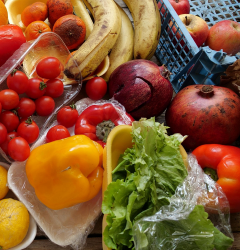18 May

5 Retail Waste Management Tips You Wish You Knew Before
Every year, about one-third of all food produced for human consumption is wasted. That equates to 1.3 billion tonnes of perfectly fine food being thrown away. Grocery stores are in terrible condition. Shoppers anticipate a big volume and diverse assortment of items on shelves, especially since when going to the grocery store is the most exciting thing we do all week. Supermarkets will lose out to a competition if they do not overstock with absolutely anything and everything a consumer may desire. However, as public concern about the climate crisis grows, consumers are becoming more aware of the reality of food waste and how their purchasing habits are exacerbating the problem. Grocery stores can and should make significant improvements to help reduce food waste. Here are just a handful of the measures you may do to help the retail waste management and environment.
1. Implement technologies for monitoring expiry dates
Unsold items that have beyond their expiry date are one of the leading sources of food waste at the shop level. This issue is solved with expiration date tracking technology. Automating the manual verification of expiry dates not only saves time but also enables retailers to discount soon-to-expire items, ensuring that nothing goes to waste while also earning a little more income. And, with supermarket stores doing so much more with less time and resources these days, this kind of technology will be a huge benefit to overworked store workers!
2. Replace old appliances with new ones
According to the International Energy Agency (IEA), the grocery retail sector accounts for 2% of worldwide power use – more than data centers! Implementing energy and asset-monitoring technologies across shops may make a largely positive influence at scale and play an important part in creating solutions for a globally stressed food chain. The issue is to preserve food quality and safety so that items do not go to waste while using as little energy as feasible. The use of contemporary refrigeration units that are efficient, dependable, and maintain food at the proper temperatures.
3. Inform store personnel about food waste concerns
Store crew training should, of course, be a top focus for retailers across the board. However, the urgency of the climate catastrophe makes it even more critical to ensure that your workers are knowledgeable about food waste. Incorporating particular courses on food waste into your training program can raise employee knowledge of the problem and motivate them to contribute to its resolution.
4. Increase the openness and agility of your supply chain
Food waste is a problem that affects the whole supply chain, from farms to consumers. Better communication and coordination between shops and suppliers will undoubtedly minimize the amount of waste created by retailers by allowing for more flexibility in delivery and last-minute order modifications. For example, one business may discover that their candy bars are selling out too rapidly, while their fresh veggies are just not selling. If they have a solid connection with their supplier, they may change their order and avoid wasting those vegetables by sending them to a different shop instead.
5. Donate any extra food
Data suggest that retailers can do more to guarantee that extra food reaches people in need. In the United Kingdom, the top ten supermarket companies donate less than 9% of their excess food for human consumption. While merchants and food companies have made attempts to enhance food redistribution, charities believe they could go further. The European Food Banks Federation is a network of over 300 food banks in 29 European nations working to eliminate food poverty and waste. Its ‘Food No Waste’ initiative invites companies to describe how they are addressing the problem. Partnerships with local businesses that repurpose leftover ingredients into meals for people in need, no food waste cookbooks, and apps that monitor extra food and transfer it to regions where contributions are in great need are all ideas.
Bottom Line
The world’s food waste issue necessitates drastic adjustments across the food supply chain. Is your company equipped with the tactics it needs to succeed? Contact us to learn how we can assist you in measuring and acting on food excess and waste for perfect retail waste management.
Related Post
Tags
Keywords
Tags
Resources
© 2020-2024 Link Retail. All rights reserved.











